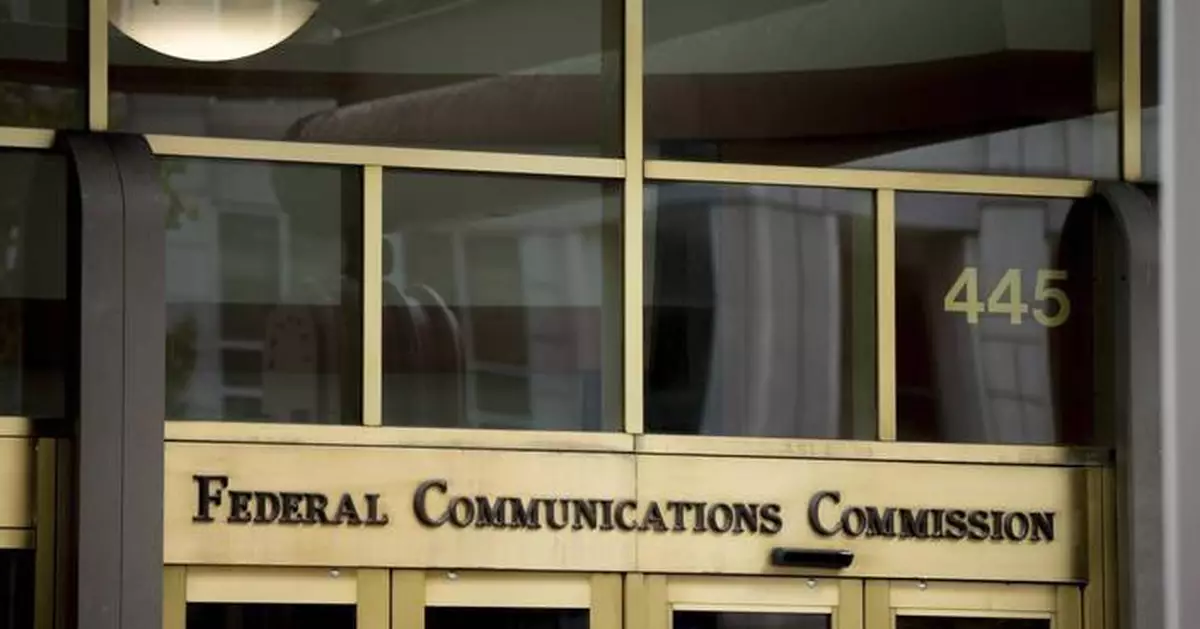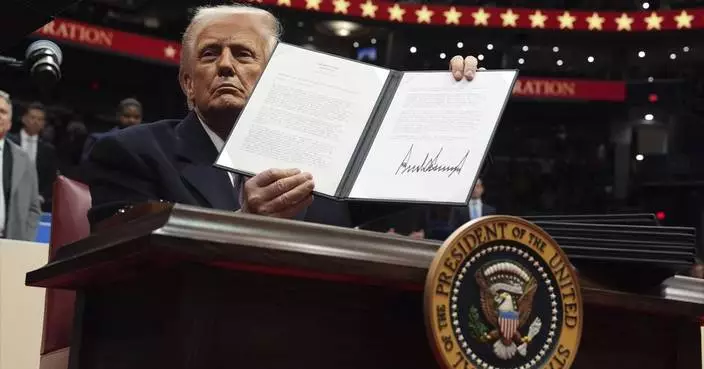WASHINGTON (AP) — In the name of consumer protection, a slew of U.S. federal agencies are working to make it easier for Americans to click the unsubscribe button for unwanted memberships and recurring payment services.
A broad new government initiative, dubbed “Time Is Money," includes a rollout of new regulations and the promise of more for industries spanning from healthcare and fitness memberships to media subscriptions.
“The administration is cracking down on all the ways that companies, through paperwork, hold times and general aggravation waste people's money and waste people's time and really hold onto their money,” Neera Tanden, White House domestic policy adviser, told reporters Friday in advance of the announcement.
“Essentially in all of these practices, companies are delaying services to you or really trying to make it so difficult for you to cancel the service that they get to hold onto your money for longer and longer," Tanden said. "These seemingly small inconveniences don't happen by accident — they have huge financial consequences.”
Efforts being rolled out Monday include a new Federal Communications Commission inquiry into whether to impose requirements on communications companies that would make it as easy to cancel a subscription or service as it was to sign up for one.
The Federal Trade Commission in March 2023 initiated “click to cancel” rulemaking requiring companies to let customers end subscriptions as easily as they started them.
Also Monday, the heads of the departments of Labor and of Health and Human Services are asking health insurance companies and group health plans to make improvements to customer interactions with their health coverage, and “in the coming months will identify additional opportunities to improve consumers’ interactions with the health care system," according to a White House summary.
The government already has launched several initiatives aimed at improving the consumer experience.
In October, the FTC announced a proposed rule to ban hidden and bogus junk fees, which can mask the total cost of concert tickets, hotel rooms and utility bills.
In April, the Transportation Department finalized rules that would require airlines to automatically issue cash refunds for things like delayed flights and to better disclose fees for baggage or reservation cancellations.
The department also has taken actions against individual companies accused of misleading customers.
In June, the Justice Department, referred by the FTC, filed a lawsuit against software maker Adobe and two of its executives, Maninder Sawhney and David Wadhwani, for allegedly pushing consumers toward the firm's “annual paid monthly” subscription without properly disclosing that canceling the plan in the first year could cost hundreds of dollars.
Dana Rao, Adobe's general counsel, said in an emailed statement that Adobe disagrees with the lawsuit’s characterization of its business and “we will refute the FTC’s claims in court.”
“The early termination fees equate to minimal impact to our revenue, accounting for less than half a percent of our total revenue globally, but is an important part of our ability to offer customers a choice in plans that balance cost and commitment,” Rao said.
Some business advocates are not a fan of the government's overall efforts to crack down on junk fees.
Sean Heather, senior vice president of international regulatory affairs and antitrust at the U.S. Chamber of Commerce, said the initiative is “nothing more than an attempt to micromanage businesses’ pricing structures, often undermining businesses’ ability to give consumers options at different price points.”
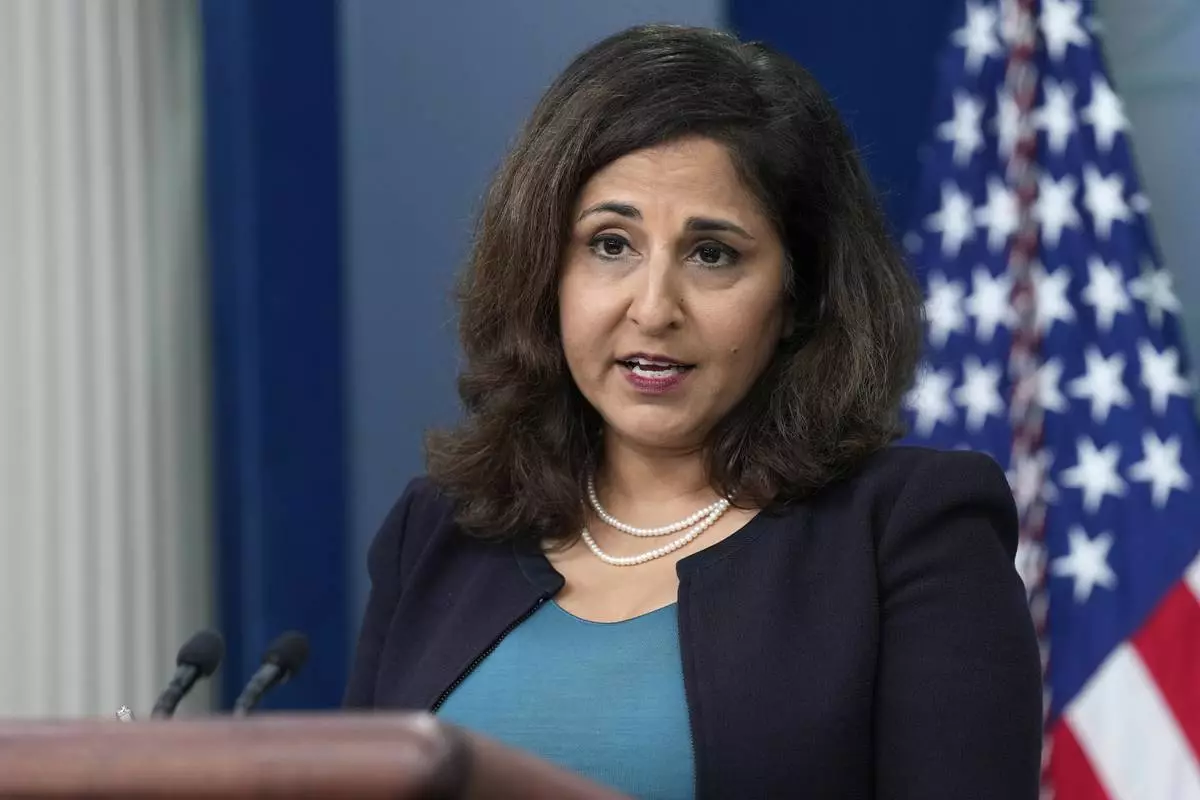
FILE - Domestic policy adviser Neera Tanden speaks during the daily briefing at the White House in Washington, Aug. 29, 2023. (AP Photo/Susan Walsh, File)
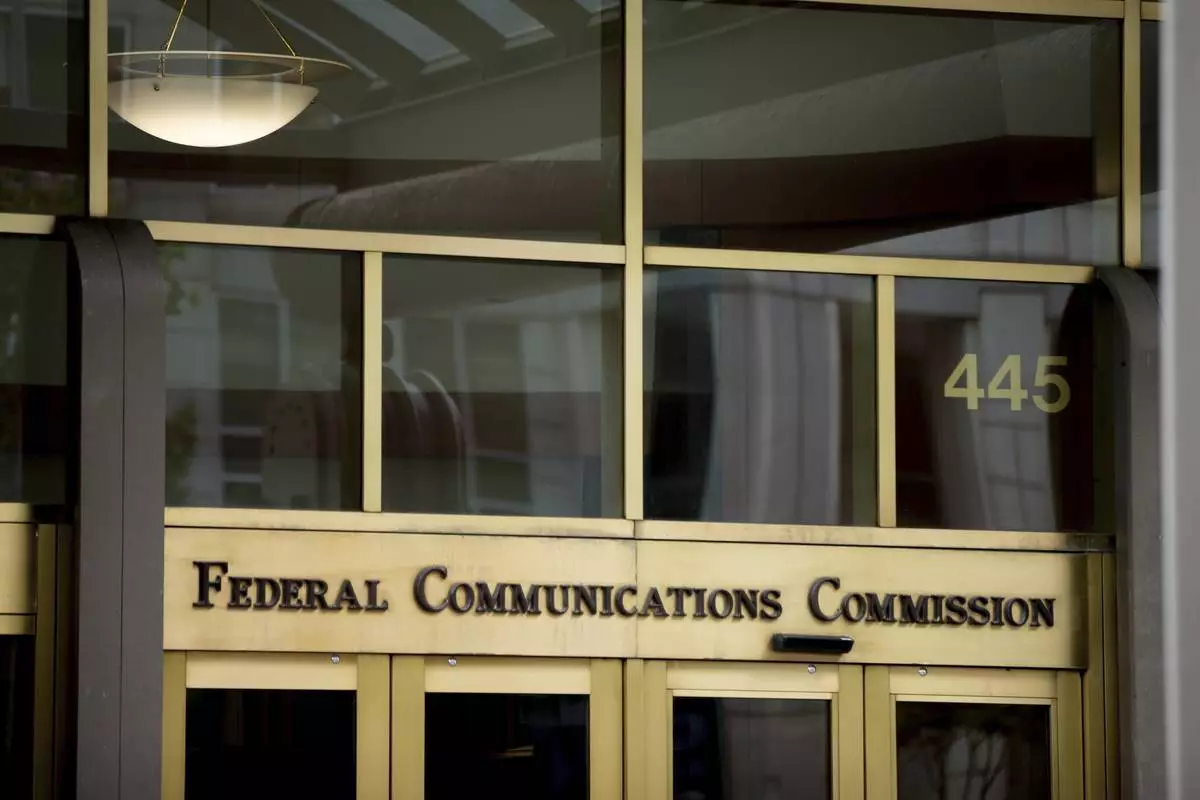
FILE - The Federal Communications Commission building is pictured, June 19, 2015, in Washington. (AP Photo/Andrew Harnik, File)
What's in a name change, after all?
The water bordered by the Southern United States, Mexico and Cuba will be critical to shipping lanes and vacationers whether it’s called the Gulf of Mexico, as it has been for four centuries, or the Gulf of America, as President Donald Trump ordered this week. North America’s highest mountain peak will still loom above Alaska whether it’s called Mt. Denali, as ordered by former President Barack Obama in 2015, or changed back to Mt. McKinley as Trump also decreed.
But Trump's territorial assertions, in line with his “America First” worldview, sparked a round of rethinking by mapmakers and teachers, snark on social media and sarcasm by at least one other world leader. And though Florida Gov. Ron DeSantis put the Trumpian “Gulf of America” on an official document and some other gulf-adjacent states were considering doing the same, it was not clear how many others would follow Trump's lead.
Mexican President Claudia Sheinbaum joked that if Trump went ahead with the renaming, her country would rename North America “Mexican America.” On Tuesday, she toned it down: “For us and for the entire world it will continue to be called the Gulf of Mexico.”
Map lines are inherently political. After all, they're representations of the places that are important to human beings — and those priorities can be delicate and contentious, even more so in a globalized world.
There’s no agreed-upon scheme to name boundaries and features across the Earth.
“Denali” is the mountain's preferred name for Alaska Natives, while “McKinley" is a tribute to President William McKinley, designated in the late 19th century by a gold prospector. China sees Taiwan as its own territory, and the countries surrounding what the United States calls the South China Sea have multiple names for the same body of water.
The Persian Gulf has been widely known by that name since the 16th century, although usage of “Gulf” and “Arabian Gulf” is dominant in many countries in the Middle East. The government of Iran — formerly Persia — threatened to sue Google in 2012 over the company’s decision not to label the body of water at all on its maps. Many Arab countries don’t recognize Israel and instead call it Palestine. And in many official releases, Israel calls the occupied West Bank by its biblical name, “Judea and Samaria.”
Americans and Mexicans diverge on what to call another key body of water, the river that forms the border between Texas and the Mexican states of Chihuahua, Coahuila, Nuevo Leon and Tamaulipas. Americans call it the Rio Grande; Mexicans call it the Rio Bravo.
Trump's executive order — titled “Restoring Names That Honor American Greatness” — concludes thusly: “It is in the national interest to promote the extraordinary heritage of our Nation and ensure future generations of American citizens celebrate the legacy of our American heroes. The naming of our national treasures, including breathtaking natural wonders and historic works of art, should honor the contributions of visionary and patriotic Americans in our Nation’s rich past.”
But what to call the gulf with the 3,700-mile coastline?
“It is, I suppose, an internationally recognized sea, but (to be honest), a situation like this has never come up before so I need to confirm the appropriate convention,” said Peter Bellerby, who said he was talking over the issue with the cartographers at his London company, Bellerby & Co. Globemakers. “If, for instance, he wanted to change the Atlantic Ocean to the American Ocean, we would probably just ignore it."
As of Wednesday night, map applications for Google and Apple still called the mountain and the gulf by their old names. Spokespersons for those platforms did not immediately respond to emailed questions.
A spokesperson for National Geographic, one of the most prominent map makers in the U.S., said this week that the company does not comment on individual cases and referred questions to a statement on its web site, which reads in part that it "strives to be apolitical, to consult multiple authoritative sources, and to make independent decisions based on extensive research.” National Geographic also has a policy of including explanatory notes for place names in dispute, citing as an example a body of water between Japan and the Korean peninsula, referred to as the Sea of Japan by the Japanese and the East Sea by Koreans.
In discussion on social media, one thread noted that the Sears Tower in Chicago was renamed the Willis Tower in 2009, though it's still commonly known by its original moniker. Pennsylvania's capital, Harrisburg, renamed its Market Street to Martin Luther King Boulevard and then switched back to Market Street several years later — with loud complaints both times. In 2017, New York's Tappan Zee Bridge was renamed for the late Gov. Mario Cuomo to great controversy. The new name appears on maps, but “no one calls it that,” noted another user.
“Are we going to start teaching this as the name of the body of water?” asked one Reddit poster on Tuesday.
“I guess you can tell students that SOME PEOPLE want to rename this body of water the Gulf of America, but everyone else in the world calls it the Gulf of Mexico,” came one answer. “Cover all your bases — they know the reality-based name, but also the wannabe name as well.”
Wrote another user: “I'll call it the Gulf of America when I'm forced to call the Tappan Zee the Mario Cuomo Bridge, which is to say never.”

FILE - President Donald Trump speaks in the Roosevelt Room of the White House, Tuesday, Jan. 21, 2025, in Washington. (AP Photo/Julia Demaree Nikhinson, File)
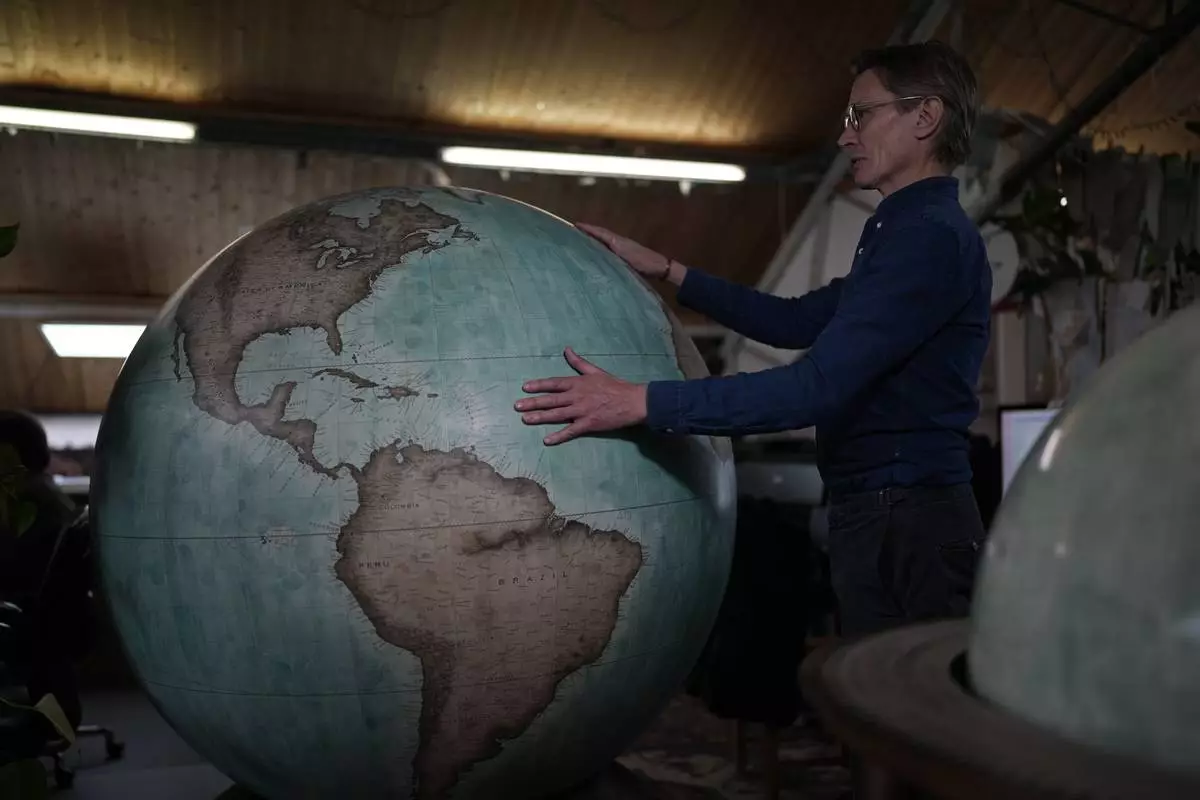
FILE - Peter Bellerby, the founder of Bellerby & Co. Globemakers, holds a globe at a studio in London, Tuesday, Feb. 27, 2024. (AP Photo/Kin Cheung, File)
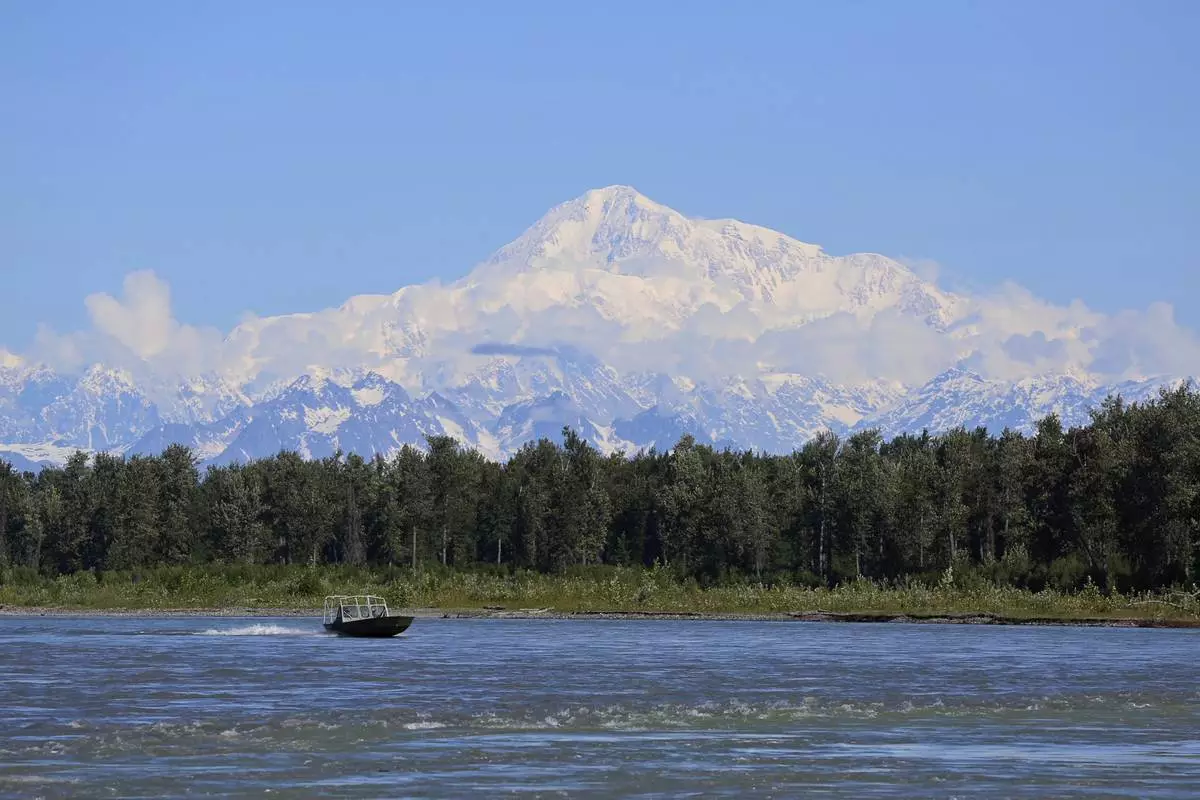
FILE - A boat is seen on the Susitna River near Talkeetna, Alaska, on Sunday, June 13, 2021, with Denali in the background. Denali, the tallest mountain on the North American continent, is located about 60 miles northwest of Talkeetna. (AP Photo/Mark Thiessen, File)
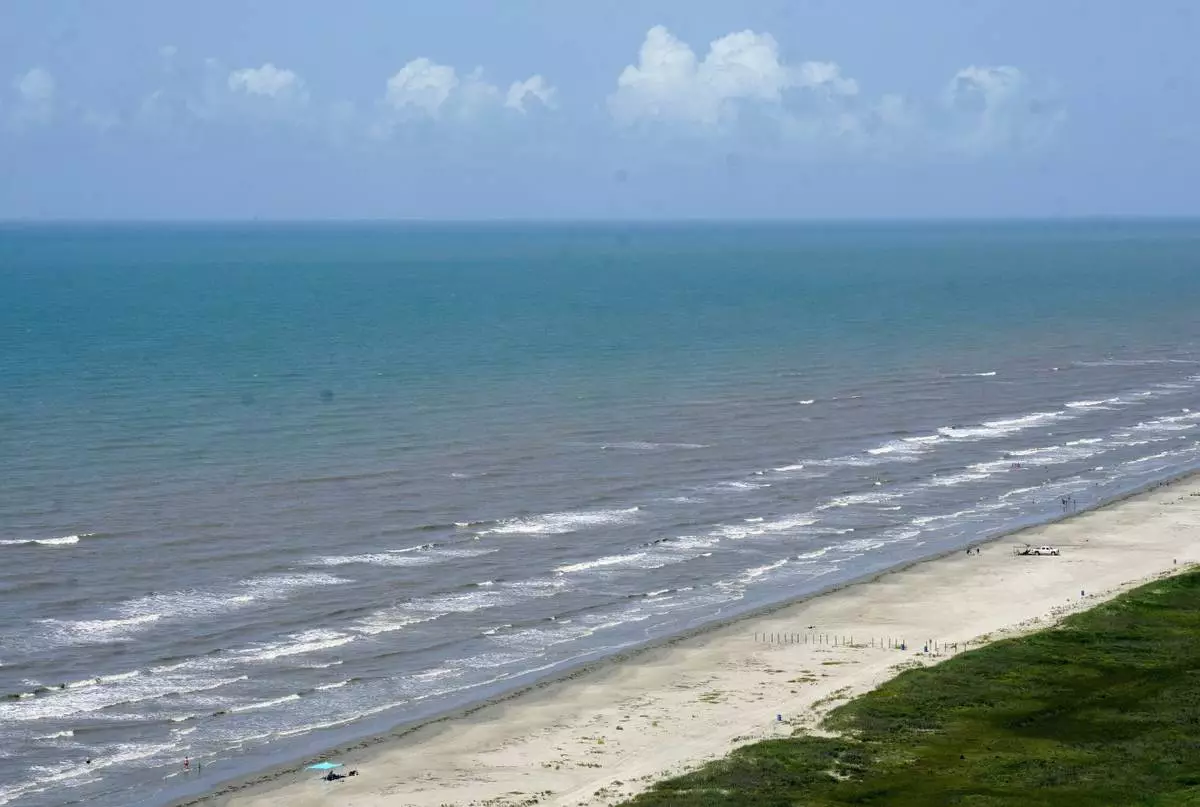
FILE - The water in the Gulf of Mexico appears bluer than usual off of East Beach, Saturday, June 24, 2023, in Galveston, Texas. (Jill Karnicki/Houston Chronicle via AP, File)




